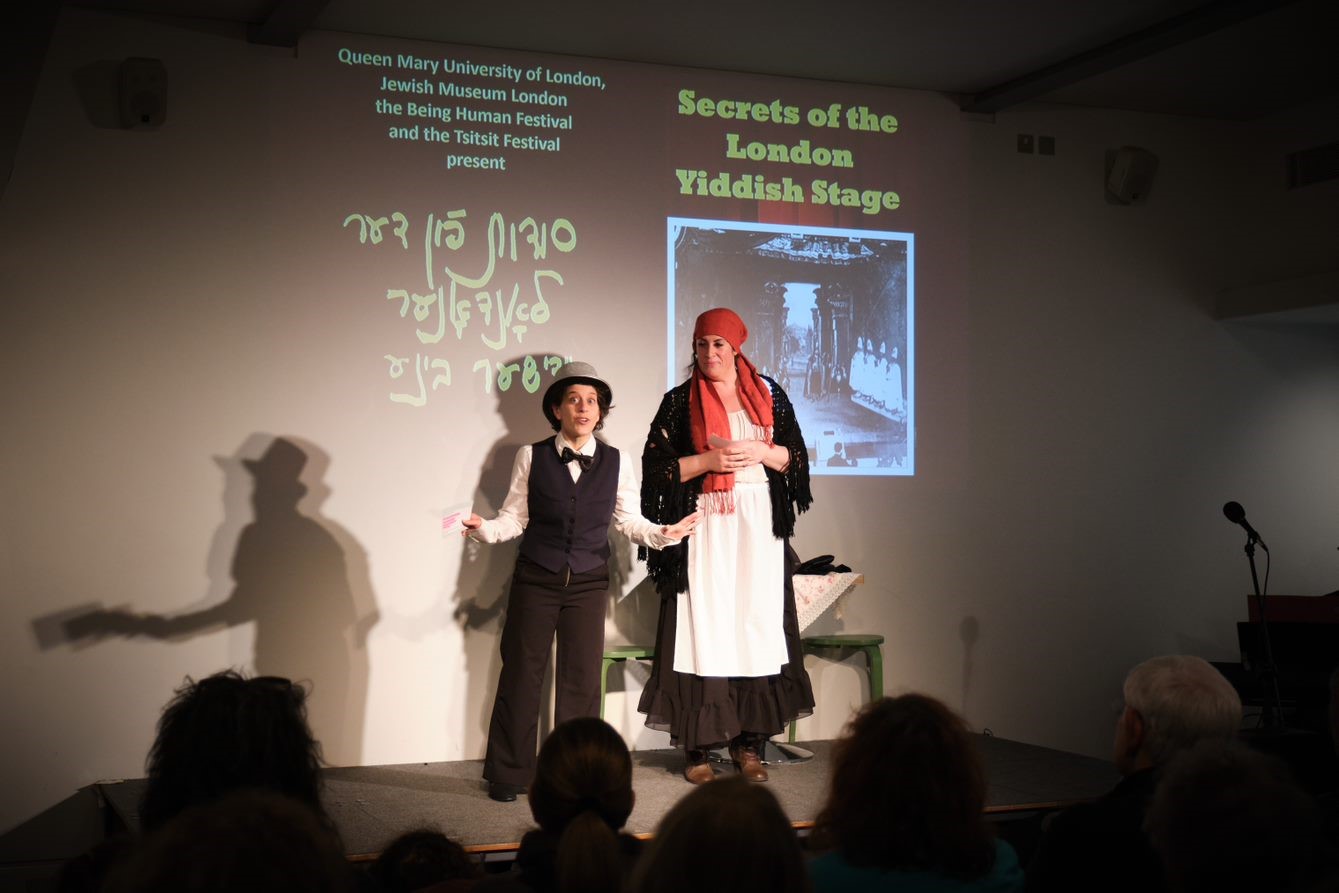Secrets of the London Yiddish Stage
Vivi Lachs writes about creating an event for last year's Being Human Festival. If you're feeling inspired, find out more about taking part in Being Human 2023.

Actors at 'Secrets of the London Yiddish Stage'. Photo credit: Alexis Andreou of Jovis Creative.
From the mid-1880s, London’s East End became home to thousands of Yiddish-speaking immigrant Jews from Eastern Europe escaping acute poverty and violence. The East End became Britain’s bustling centre of Yiddish culture: a vibrant Yiddish press and the popular London Yiddish theatre and music hall. The Being Human event Secrets of the London Yiddish Stage was designed to bring an experience of the sketches and songs performed there, written between the mid-1880s to the early 1940s, to a broad audience at the Jewish Museum, unfamiliar with the styles and histories it contained. This event was part of an AHRC funded project Making and Remaking the Jewish East End.
The background research to find plays written by London Yiddish writers and translate them was several months of preparation; scouring archives at the British Library, the National Library of Israel, the New York Public Library, and private collections. I ended up with a range of material and chose to translate three sketches: a verse drama about coerced army conscription in Russia, a play about the British election of 1910, and a soap opera set in the late twenties.
The next stage was to design an evening for a public audience to be entertained, understand some historical background, get a feeling for the Yiddish language and an idea of how people experienced the Yiddish theatre. Background context was conveyed through in-role introductions and sketches and narrations of two short stories from the thirties about the London Yiddish theatre. The Yiddish sections included a scene from the Merchant of Venice (translated into Yiddish by Abish Meisels, the grandfather of the actor David Schneider, who was one of the evening's performers and a big audience draw), a short section of another Yiddish play and music-hall songs with all-join-in Yiddish choruses. The songs came from earlier research and I had been performing these with my band for some years. All Yiddish sections needed background slides with translations.
When the process of finding, designing and translating was completed, I needed to engage actors and musicians, book rehearsal space, direct rehearsals, create the powerpoint presentation, make actors scripts and a programme and have them printed, and do all the administrative work for the evening itself, including ticketing and risk assessment. It was a huge amount of work and at times seemed overwhelming, especially as I was fitting this into other work commitments. Of particular challenge were the administrative parts, but I had significant support from the Queen Mary University admin teams, the Being Human team and the Jewish Museum who partnered this event. I was helped by people responding quickly to emails with advice, contacts and answers to questions, and the preparation was much smoother than I anticipated. It felt like a very effective collaboration, and I am grateful for this. The publicity went out from all of these organisations and more, which resulted in a very diverse audience.
Amongst the participants, it was important to create a warm and informal atmosphere in rehearsals, giving the actors, who didn’t know each other, opportunities to enjoy the whole process, and the musicians needed enough time to rehearse, set up and sound check. The evening had to feel relaxed even if I felt like I was juggling a lot of balls!
The evening was very successful and I was relieved and delighted. Although I have organised gigs and events before, this was significantly more involved, and having to negotiate last minute technical and ticketing issues. Despite taking on the lion’s share of the work, I could not have done this without the collaborative effort between myself, the performers and the solid administrative support from all sides.